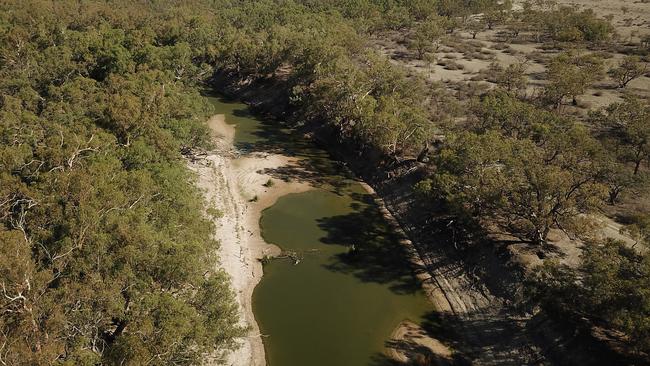Murray-Darling Basin buyback plan is above board, ‘Shorten is becoming desperate’: PM
The PM has defended the Murray-Darling Basin plan amid growing calls for a buyback inquiry.

Labor has ramped up pressure over the Coalition over a controversial $80 million water purchase and has pledged to tackle tax havens by introducing a publicly accessible register for ultimate ownership of companies and to bring transparency to offshore firms bidding for government tenders.
Scott Morrison today said the price that was negotiated for the water was done “at arm’s length from ministers” and that previous Labor governments have dealt with the company at the centre of the claims.
“It was done by the department, and working through the normal process, which include the assessments of the environmental and economic impacts and arriving at the ultimate price,” the Prime Minister said.
“The department has appeared before the Senate inquiry and has gone through the details of the process that led them to that price and how it was transacted. In addition, there is the auditor general who undertakes the regular analysis and review of the arrangements,” Mr Morrison said.
“The Murray-Darling Basin issue is bipartisan and one arrived at after a great deal of work. No agreement is perfect, but it is one that enjoys bipartisan support and transactions have been undertaken by both sides of government when they’ve been in government when achieving that plan,” he said.
“Bill Shorten has become more desperate and Labor have become more desperate, and so, they try throwing mud around.”
The comments came after Liberal campaign spokesman Simon Birmingham dismissed claims the government’s water purchases from two properties in 2017 “verges on “corruption”, after Greens leader Richard Di Natale made the allegations about the payments made to Eastern Australia Agriculture, a holding company previously linked to Energy Minister Angus Taylor.
Senator Di Natale and a string of crossbench Senators have led calls for a wide-ranging royal commission into the management of the river system after questions resurfaced about the government buying water from two properties.
“It verges on corruption and that’s why we do need to see a full-throated investigation,” he told ABC Radio National on Monday.
But Senator Birmingham hit back at the Greens, describing Senator Di Natale’s comments as scurrilous.
“We think a royal commission into allegations that are completely baseless would be a waste of time and money,” Senator Birmingham said. He said the company’s original asking price had been more than $5000 a megalitre, but the agreed price was closer to $2700 a megalitre. “The environmental and water department officials involved in the negotiation clearly drove a bargain to make sure they got an appropriate, competitive market price,” Senator Birmingham said.
A series of independent candidates, including former MP Rob Oaskeschott, Tony Abbott rival Zali Steggall, and Josh Frydenberg challenger Oliver Yates, and Malcolm Turnbull’s replacement Dr Kerryn Phelps have also demanded that the new parliament following the May 18 election demand a National Integrity Commission investigate the claims.
Twelve independent candidates have signed a statement jointly calling for Scott Morrison and government politicians to explain their personal roles in the water buyback. “One of the overriding issues that has caused us all to stand in this Federal election is the need for integrity and good governance; something we feel has been lacking in recent years,” the statement said.
In August 2017, the government bought 28.7 gigalitres of water from two Eastern Australia Agriculture-owned properties, Clyde and Kia Ora, in Queensland at a cost of $78.9 million.
Eastern Australia Agriculture’s parent company is based in the Cayman Islands, a well-known tax haven.
Labor has written to the Agriculture and Water Resources Department seeking by Tuesday, copies of documents relating to due diligence checks, information about the validity of the licences on offer, proof that the sale met federal procurement rules, and advice provided by the state government, Murray Darling Basin Authority and Commonwealth Environmental Water Holder.
Labor frontbencher Tony Burke said some of this information had previously been released to the Senate in a heavily edited form, but it was now time to release it unedited.
The department has dismissed suggestions the water can’t be used away from the properties, arguing the purchase has significant environmental benefits. “This water was purchased for an environmental outcome. It was not, as is claimed, the largest purchase ever made,” Senator Birmingham said.
Meanwhile, Labor assistant treasury spokesman Andrew Leigh has pounced on the focus on tax havens, and pledged to set up a publicly accessible registry of the beneficial ownership of Australian companies and legal entities, which would include trusts.
“This will allow everyone to find out who really owns our firms, meaning shareholders could no longer use complex structures and sham ownership to bend transparency rules and bamboozle regulators,” Mr Leigh said.
Labor would also require government tenders to disclose the country where they’re legally domiciled, and companies gunning for government contracts worth more than $200,000 would be required to disclose where they are legally based for tax purposes.
“No firm headquartered in a tax haven would be able to get a significant government contract without revealing their true status,” Mr Leigh said.
Along with the proposals, tax deductions for flights and travel to black-listed tax havens will be banned and a Labor government would fund international programs aimed at auditing multinationals for tax purposes.
Labor’s Jenny McAllister said Barnaby Joyce, who was water minister at the time, needed to make it clear how the buyback represented value for money. “$80 million on a water purchase, not through a tender process, what actually happened?” she told Seven’s Sunrise.
Nationals deputy leader Bridget McKenzie said the previous release of documents was done following a “stock standard procedure”.
-With AAP



To join the conversation, please log in. Don't have an account? Register
Join the conversation, you are commenting as Logout